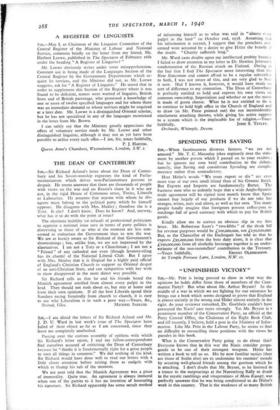Sm,—I am afraid the letters of Sir Richard Acland and
Mr. J. D. U. Ward in last week's issue of The Spectator have failed of their object so far as I am concerned, since they leave me completely unabashed.
Passing over the curious assembly of epithets with which Sir Richard's letter opens, I and my fellow-correspondents find ourselves accused of criticising the Dean of Canterbury because he " thinks it is fundamentally right for a great people to own all things in common." We did nothing of the kind. Sir Richard would have done well to read our letters with a little closer attention before seizing them as cudgels with which to thump his tub of the moment.
We arc next told that the Munich Agreement was a piece of immorality. Quite true. An agreement is always immoral when one of the parties to it has no intention of honouring his signature. Sir Richard apparently has some occult method
of informing himself as to what was said in "almost every pulpit in the land " on October and, 1938. Assuming that his information is correct, I suggest that the preachers con• cemed were actuated by a desire to give Hitler the benefit of the doubt. " Charity suffereth long."
Mr. Ward casts doubts upon my intellectual probity becathe I failed to draw attention in my letter to Dr. Hewlett Johnson's condemnation of the Russian attack on Finland. Owing to the fact that I find The Spectator more interesting than the New Statesman and cannot afford to be a regular subscriber to both, I was not aware of this, and am very glad to hear it now. Had I known it, however, it would have made no sort of difference to my contention. The Dean of Canterbury is perfectly entitled to hold and express his own views on common ownership, Imperialism and whether or not the moon is made of green cheese. What he is not entitled to do is to continue to hold high office in the Church of England and to draw (as Mr. Paine pointed out) the not inconsiderable emolument attaching thereto, while giving his active support to a system which is the implacable foe of religion.—Yours faithfully, Join,/ S. TETLEY. Orchards, Whimple, Devon.














































 Previous page
Previous page